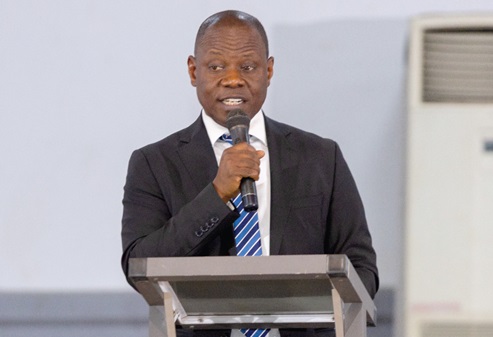
Rodney’s Potpourri: Any lessons from Covid-19?
In 2012, on the occasion of Opoku Ware School’s 60th anniversary celebrations, alumni fraternity (Akatakyie) decided to establish the Burges, Kalinauckas, Adu-Amankwah Memorial Lecture in honour of the school’s first three headmasters and further to highlight issues of public importance.
It is held biennially.
This year, the topic for our lecture was ‘Navigating a post-Covid era – Public Health Lessons from a Pandemic’.
The speaker was Katakyie Dr Patrick Kuma-Aboagye (AB123), Director-General of the Ghana Health Service.
We settled on Thursday, March 7, 2023 at the Christ the King Parish Hall in Cantonments, Accra. Kat. Kofi Nsiah-Poku, Chief Executive Officer of Kinapharma Ltd, chaired the event.
For most of the year 2020, and some part of the subsequent year, the world was gripped by the Covid-19 pandemic, with considerable repercussions on so many aspects of life as we knew it.
We believed it was important to look at some of the challenges and lessons of the pandemic and address preparations for possible similar outbreaks in the future.
Background, challenges
In an expansive lecture, Dr Kuma-Aboagye first took us through the background to the official announcement of the first two cases of Covid-19 in Ghana in March 2020.
He noted that initially, the major challenges confronting the country were inadequate laboratory capacity for testing, inadequate Personal Protective Equipment(PPEs), inadequate reagents for testing, fear and panic within the healthcare worker corps and the public.
He recalled that as the pandemic wore on, other challenges emerged: misinformation about the disease, its origin, and its supposed use as a biological weapon.
Another major challenge was the non-adherence to preventive measures such as face mask use, which saw significant variations in utilisation.
At the later stages of the pandemic, vaccine hesitancy and misinformation were the most common challenges encountered.
Lessons
On lessons learnt from the pandemic, Dr Kuma-Aboagye emphasised on the need for multi-sectoral collaboration, the importance of preventive measures, the risks posed to national development by the pandemic, the importance of vaccines in saving lives, and the need to improve the economic fortunes of the marginalised, especially those who have to work daily to make ends meet, among others.
He also noted that the pandemic afforded the country the opportunity to demonstrate resilience.
The rapidity with which pharmaceutical and non-pharmaceutical industries took up the challenge to produce face masks and hand sanitisers locally was an example of resilience.
The veterinary services department laboratories who were akin to animal testing took up testing for human samples, something that was not the norm.
In addition, organisations adjusted their work schedules including allowing for working from home which clearly demonstrates ability to adjust to evolving situations in short periods.
He further highlighted the challenges posed by misinformation and the need to ensure contingency planning for public emergencies, as well as the need to strengthen human resources for health as key lessons.
Citing the President’s leadership during the crisis, he emphasised that political leadership was key to such situations.
How ready are we?
According to Dr Kuma-Aboagye, COVID-19 response efforts have resulted in better and improved infrastructure and human resource for public health emergencies.
For instance there are now 15 treatment centres across the country, with oxygen plants and concentrators deployed across the country.
Laboratory testing capacity (Molecular testing NPHRL, in all 3 zonal laboratories, P3 Laboratories) has also been scaled up including capacity for genomic sequencing at our reference laboratories.
In addition, a National Vaccine Institute has been established by an Act of Parliament to ensure that the enabling environment is created to produce vaccines locally.
He also noted that there have also been trained healthcare workers in areas such as molecular diagnostics, public health emergency preparedness and response among others.
The Public Health Act being amended to be more responsive to public health emergencies.
According to him, the nation’s prompt response to Lassa fever and the Marburg virus are clear examples that lessons have been learnt relative to response to public health threats.
The creation of e-surveillance and regular updates on priority public health diseases was critical in the rapid containment at source of these outbreaks, he noted.
He further cited better collaboration with private sector and local and international agencies and improved clarity on roles of various actors in pandemics as being useful in such situations at all levels.
It was a masterly lecture by all accounts, deeply appreciated by all who attended.
Katakyie John Kumah (AV241)
On Thursday I was helping to set up the lecture venue when sad news of the passing of Kat John Kumah (AV241), Deputy Minister for Finance, MP for Ejisu and Senior Prefect of the school in 1997 reached me.
We were expecting him at the event.
Forever passionate about his alma mater, he recently completed the building of an Information and Communications Technology (ICT) and Innovation Centre for the school from his own resources, to be named after Asantehene Osei Tutu II.
Arrangements were on course to invite Otumfuo to inaugurate the building later this year.
May God grant him eternal rest.
Rodney Nkrumah-Boateng,
Head, Communications & Public Affairs Unit,
Ministry of Energy.
E-mail:
